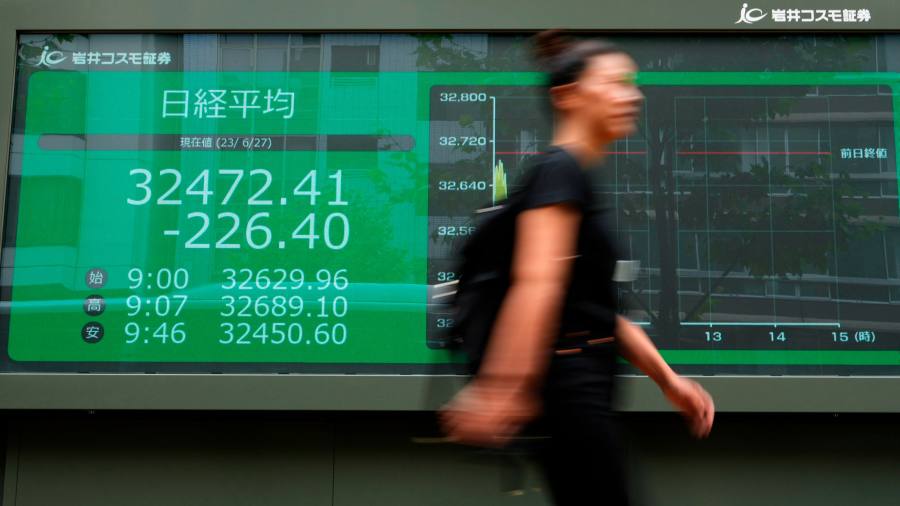
Receive free Asia-Pacific equities updates
We’ll send you a myFT Daily Digest email rounding up the latest Asia-Pacific equities news every morning.
Japanese stocks are drawing in global investment flows after their strongest start to a year in a decade, chipping away at fund managers’ scepticism after a long period of false starts and disappointment.
The country’s two most closely watched equities indices are among the top performers in the world so far this year, with the exporter-focused Nikkei 225 up 27 per cent.
The broader Topix, which gives a heavier weighting to banks and more domestically focused companies, is up 21 per cent, almost equal to the best half-year since 2016. Even flipped into dollars to ease comparisons, the pair stands among the strongest in global markets.
Some former doubters are starting to believe the momentum will hold. This week, BlackRock said it was “rethinking” its cautious stance on the country’s stocks, saying they “stand out” from others in the developed world.
As recently as February, the world’s largest asset manager went underweight Japanese stocks, which means it would take on a lower weighting to Japan than global benchmarks would suggest — generally a stance that would run for six to 12 months.
Now it says the Tokyo Stock Exchange’s beefed-up guidance to listed companies that the value of their shares should outweigh their assets is a “potentially pivotal moment” for the country’s shares.
Another key factor is the new Bank of Japan governor Kazuo Ueda. Since he took up his role at the start of this year, he has made it clear that he would be slow to step back from the central bank’s ultra-low interest rate policy and programme to hold down bond yields, and more willing to tolerate higher inflation than BlackRock had envisaged.
“We thought the BoJ would be forced to scrap its yield cap and quickly tighten monetary policy because inflation surged above its 2 per cent target. We saw risks that getting rid of the cap would push up global yields and reduce risk appetite,” the asset manager said in a note. “Yet now we think the BoJ will be slow to tighten monetary policy.”
Overseas investors have racked up a 12-week run of net buying in Japanese stocks by mid-June. Foreign net buying of cash equities over the past three months amounted to ¥6.17tn ($43bn) according to analysts at Nomura Securities.
This year, the country’s stocks broke through to their strongest level since the bursting of the vast asset bubble in the 1990s, driven higher by the stock exchange push on companies to focus on raising corporate value, and a now clear rotation of Asia-focused investors out of China and in to other regional markets.
Yunosuke Ikeda, chief Japan equities strategist at Nomura Securities, noted that the relatively high proportion of purchases of cash equities — as opposed to futures — suggested that the recent rally had been driven by an arrival of large, long-only foreign investors.
“Our call is that there is another $70bn of flows still to come as global investors raise their exposure from underweight to neutral,” said Ikeda.
He and other strategists agree the foreign rotation in to Japan will have an influence on domestic institutional funds and individual investors, who are more cautious on whether the rally can last. If they see that corporate earnings remain strong, despite China’s economic downturn, or if Japanese equities rise in contrast to a falling US stock market, then domestic investors jumping in to the rally could produce what Ikeda said was a “very, very big tailwind” in to the rest of the year.
This month, the monthly global fund manager survey by Bank of America showed that allocations to Japan had reached a 19-month high. The net percentage of investors saying they were overweight Japanese equities had jumped 15 percentage points in a month up to 4 per cent. Some respondents to the bank’s survey even identified Japan as a possibly overcrowded trade.
Last month, Swiss private bank Union Bancaire Privée bought Angel Japan Asset Management, a specialist in investing in the stocks of small companies, with about $1.2bn in assets under management. “Foreigners are coming back to Japan,” said Cedric Le Berre, a portfolio manager at UBP. The acquisition of Angel — a firm it had worked with for several years — was “quite unique”, Le Berre said, but reflected the swiftly growing interest from UBP’s clients to bulk up on exposure to the country.
Analysts at Barclays also said this week that “Japanese equities continue to shine”, partly because the yen, which stands around its weakest level against the dollar in 20 years, is making it a cheap and attractive bet for foreign investors.
“Higher inflation and rates after decades of stagnation are boosting hopes of improved profitability and a new bull market in Japanese equities,” wrote strategist Emmanuel Cau and colleagues at the UK bank.